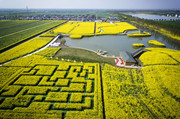Classic Operas
( chinadaily.com.cn )
Updated: 2011-09-21
|
|||||||||
Local operas are a prized heritage of Suzhou, earning the Classic Operas title.
Kunqu, also called Kun Opera, is one of the oldest forms of Chinese Operas, also considered to be one of its Four Great Characteristic Melodies. Born in the Wu Kingdom, today’s Kunshan area of Suzhou, it grew and thrived. However, during the Cultural Revolution, opera performances were suppressed. Despite this and against all odds, Kunqu gained in popularity and significance, leading to its current position of importance and appreciation. The Kun Opera Museum, in its hometown, walks visitors through the opera’s history.
Many written novels and poems have been adapted for Kun Opera stage performances. Renowned works such as The Peony Pavilion, The Peach Blossom Fan, Water Margin, Journey to the West, and Romance of the Three Kingdoms are among the long list of literary pieces that have been adapted for Kun Opera interpretations, source of much of its admiration. The Qinlan Showplace is an ideal option if you are interested in sitting and enjoying a performance.
Another aspect of Kunqu that is still unknown to many is that it has influenced many other styles of Opera, especially its better known cousin, the Peking Opera. It is even said that the appearance of Kunqu was the key reason for the rise in popularity and success of Chinese theater and drama.
For these reasons and many more, Kunqu Opera was, in 2001, listed by UNESCO as one of the Masterpieces of the Oral and Intangible Heritage of Humanity.
Pingtan must also be noted as yet another exquisite performance art of Suzhou, after all, it is probably the most local form of performing art. Essentially, Pingtan is a story telling art where together, two artists/storytellers, one male and one female, retell traditional tales. Stories can take hours, even days to be told and so, traditionally, these performances take place in quaint and peaceful teahouses, such as the Plum and Bamboo House or Pinfang Tea House of Suzhou.
The name Pingtan comes from the unison of two Suzhou words: pinghua and tanci, storytelling and ballad singing. And so, true to its origins, Pingtan uses Wu Kingdom Chinese or Suzhou dialect, in addition to traditional Chinese instruments. Normally, the woman plays the Pipa, while the man plays a three stringed instrument. Together the melodies are sweet and support the story being told. Visit the Suzhou Opera Museum for more insight into the history of this art.
Kunqu and Pingtan, both with hundreds of years of history continue to gain popularity in modern times. The Classic Operas of Suzhou are valued as more than mere performances; the two have exerted a great amount of influence on local and national culture, and guarantee that Suzhou and China remain intimately connected to their history and legacy.







